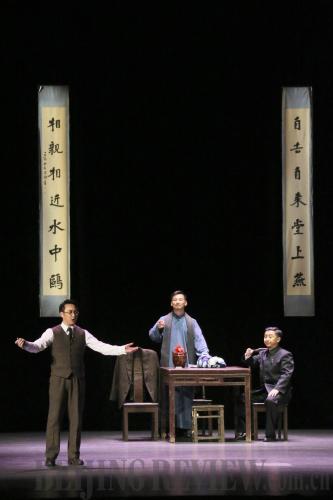|
 |
|
ON STAGE: The Invitation of Chiang Kai-shek is performed at the auditorium of the National Committee of the Chinese People's Political Consultative Conference in Beijing on May 29 (HOU JUN) |
It is rare that a play, as a cultural event, sweeps a whole nation. However, The Invitation of Chiang Kai-shek has done just that. Chiang was head of the Kuomintang that ruled China from 1928 to 1949.
The comedy, written by a then 22-year-old college student Wen Fangyi, has attracted a flood of attention from Chinese media and the public.
The show has thus far completed its first sold-out national tour, to overwhelming success. Due to popular demand, extra dates have since been added with a tour in Beijing on November 15-17.
Unexpected success
"I have not seen such an interesting and culturally rich Chinese story for a while. It is a comedy with oxygen and nutrients," said Shui Jing, a well-known local drama critic.
"The Invitation of Chiang Kai-shek is hot property. It teaches us to trust young people and establish platforms to help them release and develop their talents without hindrance," said Bai Yansong, a prominent CCTV news anchor.
Success had been unexpected, according to the young playwright. "I never expected my work to be so popular," she said.
Indeed, when writing the comedy in 2012, Wen was still a senior at School of Liberal Arts of Nanjing University in Jiangsu Province. She penned the work as part of an assignment given out by her professor and later the director of the comedy, Deputy Dean Lu Xiaoping, to celebrate the university's 110th anniversary. In May of the same year, it was first performed by the Master of Fine Arts Troupe, and directed by Lu.
The play tells the following story: In 1943, Chiang, then the new president of National Central University (renamed Nanjing University in 1949), invited three renowned professors from the Chinese Department to a New Year's Eve dinner. The seemingly innocent gesture subsequently posed a serious problem. During the "cultural revolution (1966-76)", which occurred more than 20 years later, the professors had to report to the government on whether they had accepted Chiang's invitation, as Chiang was then viewed as archenemy of the Chinese mainland.
"At the time, I thought it would only be performed once as a form of easy entertainment. To my surprise, demand for it never subsided," Wen said.
After more than 30 shows in Nanjing, the play hit Beijing, Shanghai, Xi'an, Wuhan and Chengdu, as well as other big cities across China. Its success has invariably put professional commercial troupes to shame.
However, Wen is doubtful about her work's popularity. "We don't deserve so much attention. The positive reception surpassed our expectations," she commented.
Her modest opinion is echoed by Lu. "Its fame doesn't match up," he said. "Every time we perform, I feel uneasy. The playwright is only a student while I'm not a professional director."
So far, the comedy has grossed 5 million yuan ($818,330) at the box office.
| 